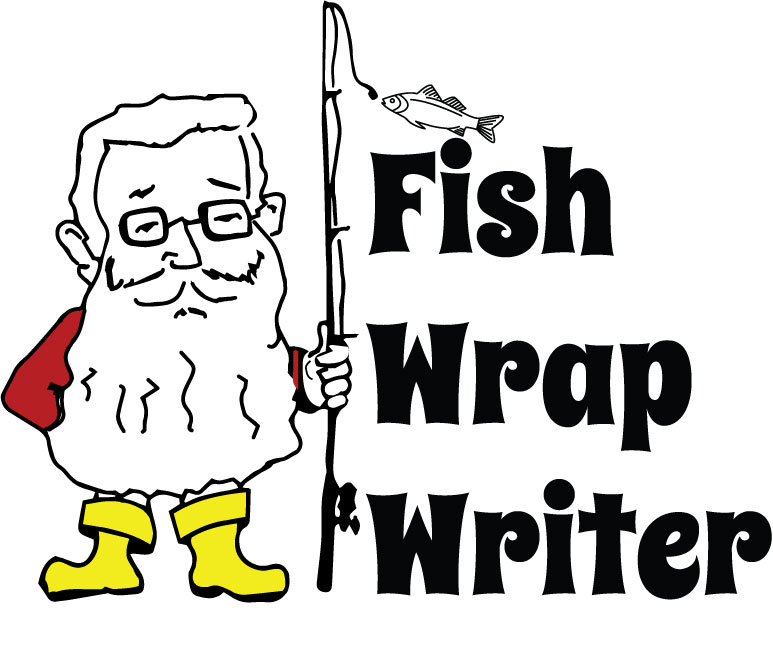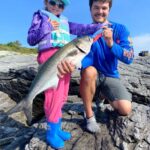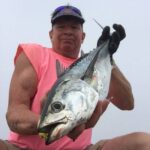It was heartening to see 80 people on a rainy February night at URI’s Corless Auditorium offering comments on the state’s proposed 2020 fisheries regulations but equally disappointing to hear so many fishermen advocate for killing smaller striped bass and more bluefish in light of our understanding that both stocks are overfished and in peril.
To be clear, both are ultimately managed by the Atlantic States Marine Fisheries Commission. 17 of the 26 species the Commission manages are either overfished, exploited or listed as “condition unknown”.
That’s not disappointing, that’s surreal.
When the Commission proposes new rules to address a stock, states often hustle to position themselves as best they can with conservation equivalency proposals which, theoretically, reach target goals, which for stripers is an 18% reduction in mortality. No conservation equivalency plan will be truly effective if there is no change in what ever-vigilant fisheries writer Charles Witek calls “equivalency without responsibility.”
After the most recent ASMFC meeting, Mr. Witek wrote that Captain John McMurray “had the courage to point out ‘the elephant in the room,’ which is the fact that some states take advantage of conservation equivalency to increase their landings.”
Steve Medeiros of the RI Saltwater Anglers Association said his group “Strongly supports the 28”-35” slot” in part because there was a chance for coast-wide acceptance, adding, “And we strongly oppose a split mode on striped bass.” Hold that thought for a minute.
Next to speak was Rick Bellevance of Priority Fishing Charters and President of the RI Party and Charter Boat Association. Rick supports Option 2 which has a 32”-40” slot limit for shore and private anglers but allows for a 30”-40” slot for for-hire boats. “This option, we think, is the right thing to do for the stock,” Bellevance said, because, “it’s more restrictive than the 28” to 35”, offers more protection for the striped bass stock and helps Rhode Island contribute to their rebuilding.”
“We also believe it protects what’s left of the 2011 year class,” he continued, adding, “And we feel we will have little impact on the private shore angler as 85-90 percent of their striped bass are released.” You’ll surely notice he said, “their.”
Mr. Bellevance’s comments recognize the striper stock is in peril but then ignore it by saying they are helping the rebuild by killing a smaller fish than the rest of the state who typically releases them. And you might wonder what happened to the 2011 year class. They got caught. His comments clearly identify who did the catching and the keeping.
Captain Richard Chatowsky passionately spoke in favor of Option 2 as well, waving an envelope of permits and licenses for his business on the water. Oftentimes in similar hearings, people remind the room of how hard they work or how many years they’ve been on the water. “Give us a little break here,” Chatowsky implored.
After Dennis Zambrotta’s comment to make the spoils and suffering equal for all users of the resource, Mr. Chatowsky recalled his hard to define “difference” between recreational and for-hire fishermen, adding that he welcomed new people to the fishery but few had worked as hard or as long as he had. That’s a big comment to someone like Mr. Zambrotta, who, with all due respect, has been a fisherman for quite a while. Few people in the State, let alone that room, have spent as much time catching fish as Mr. Zambrotta.
Mr. Chatowsky took the stance that given his personal and financial commitment to taking people fishing and therefore taking fish, he has a need which surpasses that of the recreational angler who only paid seven dollars for a license, which then implies that those with more money can hire a boat and kill smaller fish. It’s worth mentioning here that people who hire charter boats are not required to purchase a saltwater license, so no monies are generated to support new boat ramps or fishing piers or fund data gathering from those who paid that seven dollars.
He also mentioned that for-hire boats like his are an overall benefit to the fishery because he has taken so many years of records. He did not expound on the relationship between the two.
That exchange confirmed that all were not there to support the fish. Words like “us” were used, as opposed to a word like “those”. It seems rebuilding a fishery begins with separating amounts of fish for “us” as opposed to ensuring “those” fish are protected. Some supported taking smaller fish while others were trying to rebuild before a collapse. It was also disappointing to hear a well-known local captain support Option 2. Because he supports several boats and crews, shouldn’t that make him much more keen to rebuilding two important stocks so he doesn’t catch his way to the bottom of his bottom line?
Even bluefish, which we have enjoyed in seemingly astronomical numbers, are being divided to three fish per day for recreational anglers and five fish per day for for-hire boats, which should be exactly for what Mr. Chatowsky was asking. So following the lines here, the bluefish stock is in serious trouble so let’s have recreational fishermen take three and “us” for-hire fishermen take five, because we paid more for our licenses and take people fishing who aren’t required to get a license, which is what fuels the outreach, access point rebuilding and data gathering, which is then used to protect “those” fish.
That’s a ragged line.
Money is the hook. Clearly, we all want more fish and more money but as the American Saltwater Guides Association keeps advocating, abundance is what builds those businesses and you don’t build abundance by supporting plans to take as many or as small a fish as you can.
Peter Jenkins, the owner of The Saltwater Edge, called for coastal equivalency so that all states are held accountable if they fail to meet reductions. When a for-hire boat captain reminds the room that he has a fuel bill and insurance and a mate to keep busy for a season, he or she ignores that bait and tackle shops also have oil bills, insurance and full time, year round employees, so as Mr. Zambrotta commented, the highs and lows should be shared equally. It should be the same for states as well.
If the motivation is to continue in business, why didn’t anyone break into a sweat with an argument that we’re in a perfect place to affect change right now, rebuild and celebrate abundance for decades or at least, at minimum, some level of equivalency?
It’s disappointing to be going down this road again, especially for bass.
It’s disappointing for sure because that elephant Captain McMurray mentioned might just land on all of us when we’re sitting at the dock talking about how many fish there used to be.
You have until February 23 at 4:00 p.m. to file your approval, displeasure or alternative plan to be considered for the Addendum VI to Amendment 6 to the Atlantic Striped Bass Interstate Fishery Management Plan.
Send it, please, to Max Appleman at mappelman@asmfc.org.





It seems that everyone has forgotten that the best “guess” at rebuiling was 1@35. The slot at a 40′ maximum kills just about any fish caught. How many of us caught a 40″ or better fish this past 2 years ? Not many I’ll guess.
Human nature is a tough competitor. As long as we have tv shows like Wicked Tuna claiming they have to feed their families while maintaining half million dollar boatz and thousands of part time wanna be like them Charter Captains, the Buffalo Hunter mentality will prevail. Whatever new rules ge put in place an increase poaching/piracy will continue as for hire boats figure a way around the rules just as sure as cheating on taxes.